The accord between the government and the pro-talks faction of the banned United Liberation Front of Asom (ULFA) was hammered out after many brainstorming sessions lasting for more than a decade. There were phases of deadlocks when the group had almost given up hope of a negotiated settlement.
Then, a combination of many factors coalesced in the second half of this year paving the way for the agreement. Some senior functionaries of the outfit claimed that about 70 per cent of the charter of demands were accepted by the government. Many demands were rejected and many included that were not listed in the charter.
The group has agreed to surrender all weapons, shun violence, disband and join the democratic process. Diverse opinions have been articulated on the pact that swings from optimism to extreme doubt over the outcome. These views apart, certain broad conclusions about the political implications can be drawn from the accord.
Not the end of ULFA
The anti-talks group or ULFA (Independent) headed by Paresh Baruah has refused to get engaged in any peace process with the government till Assam’s sovereignty is accepted as the ‘core issue’ in the talks. This was also stated to an emissary sent to meet him by a security agency last year. So far, the BJP-led government has been unwilling to accept the precondition.
Given the BJP-led government’s deadlock with the Isak-Muivah faction of the National Socialist Council of Nagalim (NSCN-IM) over the outfit’s demand for a separate flag and constitution, it is unlikely that Baruah’s demand would be accepted. This faction has around 300 functionaries at the camps in Myanmar which is less than the strength of the pro-talks group in Assam.
ULFA (Independent) and the separatist outfits from Manipur will have ample scope to sustain their camps and training facilities as long as the war continues in Myanmar. The junta does not have the resources nor the inclination to launch an offensive against these groups. The situation could take a turn in favour of the Indian government if the opposition National Unity Government (NUG) can topple the military regime.
Safeguards for indigenous communities
The focus of the 37-page ‘charter of demands’ submitted by the pro-talks group had been on the safeguards for the indigenous communities in Assam as a shield against the unabated influx of immigrants from Bangladesh and the government’s failure to erect an effective regime of preventive measures. This was also endorsed by the Jatiyo Abhibartan (national convention) held in Guwahati in mid-2010 which elicited the views of over a hundred civil society organisations in the state.
The negotiations between the two sides over the past decade have sparked debates and heated arguments over two demands – Scheduled Tribe (ST) status to six indigenous communities in the state and reservation of seats in the elected bodies. Reservation in the elected bodies was not accepted by the government. On the demand for ST status, the agreement says that the state and central government will make efforts towards including the communities in the category. The fact remains that the Centre has not been very keen on expanding the list as it could spark similar demands from communities in other states.
The objective of stalling the further advance of the immigrant communities in the political space is sought to be fulfilled through the delimitation of assembly and Lok Sabha constituencies which was recently completed in the state. A clause in the agreement says that the government ‘will consider’ recommending to the Election Commission to follow the broad guidelines and methodology adopted during the last exercise. The agreement mentions that the representation of the indigenous communities will not be reduced in future delimitation exercises in Assam. Currently, as per an estimate, indigenes have sway over 94 seats out of a total of 126 assembly seats in the state.
Whether this clause would be implemented in the future will depend upon the ruling party in New Delhi, its electoral calculations and political equations in the state. Also, it must be borne in mind that the Centre does not have an admirable track record in implementing agreements inked with groups from the Northeast which was most evident with the Assam Accord (1985).
Further, the agreement lays down norms for preparing voters’ lists in the state. However, the clauses reflect the anxiety that had been voiced over the years by civil society groups – of voters from immigrant-dominated pockets relocating and registering as voters in constituencies dominated by indigenous communities. The accord mentioned that ‘A citizen of the country who is ordinarily resident in an Assembly Constituency shall only be registered in the voter list of that Constituency.” And, it also says that ‘effective measures’ would be initiated to prevent the enrollment of illegal migrants in the voters’ lists.
Who is an illegal immigrant in Assam has not yet been resolved till now despite two agreements between the civil society groups in Assam and the government (in 1985 and 2005). The matter is linked to a host of issues including the National Register of Citizens (NRC) whose update was completed in 2019 with 1971 as the cut-off year for determining citizenship as per the Assam Accord.
Former NRC coordinator Hitesh Deva Sarma’s affidavit to the Supreme Court three years ago has claimed that there are anomalies in the register. The accord has kept a provision for ‘reverification’ of the register if it is considered ‘necessary’ by the government after the judgement is delivered.
Early in December, a five-judge Constitution Bench in the Supreme Court headed by Chief Justice DY Chandrachud heard a bunch of petitions by local organisations in Assam challenging 1971 as the cut-off year for determining citizenship in Assam whereas it is 1950 for the rest of the country. The apex court has reserved the judgement which will certainly have long-term implications in the state.
Land rights for indigenous communities
In the safeguards earlier envisaged for the indigenous communication were land rights similar to the provisions in the hill states which would have entailed restrictions for outsiders to purchase land in the state or even diversion to non-agricultural purposes.
The government was reluctant to accept the model in the hill states as it would mean drawing up a list of the beneficiary communities. With the issue of citizenship still undecided, compiling the list in some regions of the state was considered difficult and could fuel disturbances.
As per the accord, the government will ensure the protection of agricultural land, digitisation of land records, legislation for conclusive land title and prevention of government and forest land encroachment. Agricultural land would be allowed for diversion only if it means setting up hospitals, schools and any venture that will generate employment for the local populace.
Political gain for BJP
The primary trigger for the agreement is the forthcoming general elections. The BJP and its allies won 18 Lok Sabha seats in 2019 out of a total of 25 in the North East. Two seats are ‘vulnerable’ and could swing either way if a senior BJP functionary is to be believed. The party is aiming to improve its tally next year by at least two seats.
The stalemate has continued in the talks with the NSCN(IM) in Nagaland over the demand for a separate flag and constitution for the state. There is also no scope for any agreement very soon with the overground Kuki-Zomi rebel groups in Manipur. The agreements inked with a rebel outfit in Assam early this year or with a faction of the UNLF in Manipur are not very significant and could be marketed for political gains.
So the peace pact with ULFA (Pro-Talks) came at an opportune moment for the BJP when it has not been able to fulfil other commitments made to the people of Assam such as identification and expulsion of illegal migrants. The controversial Citizenship Amendment Act (CAA) that had sparked a violent agitation in Assam and other states of the North East will be made operational soon. So the party was in dire need of an accord that could be showcased as a success in the North East.
The author is a senior journalist in Assam. Views expressed in the above piece are personal and solely that of the author. They do not necessarily reflect Firstpost’s views.
Read all the Latest News , Trending News , Cricket News , Bollywood News , India News and Entertainment News here. Follow us on Facebook , Twitter and Instagram .


)




)
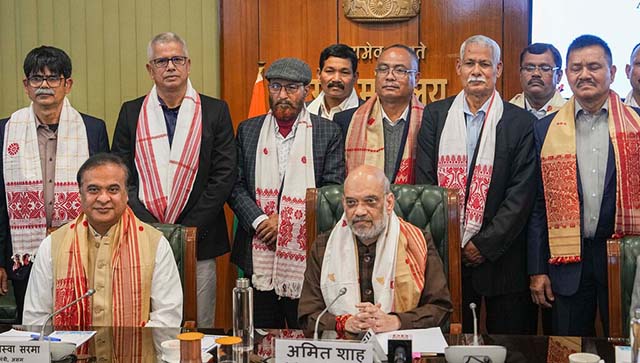)
)
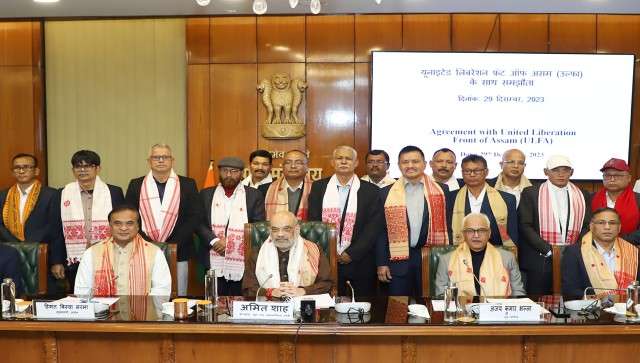)
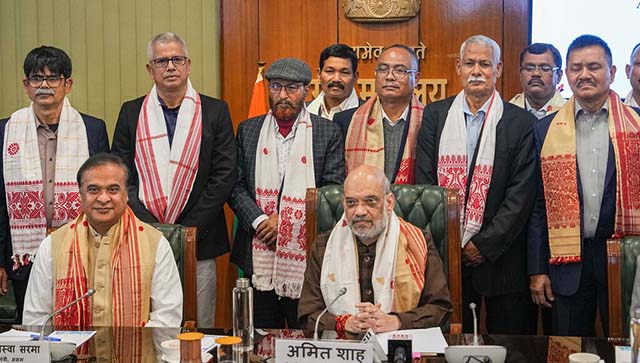)
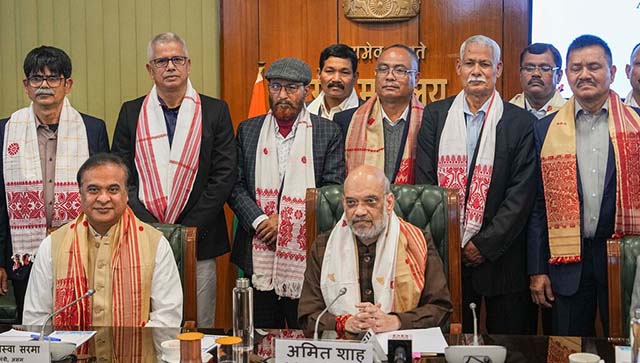)
)
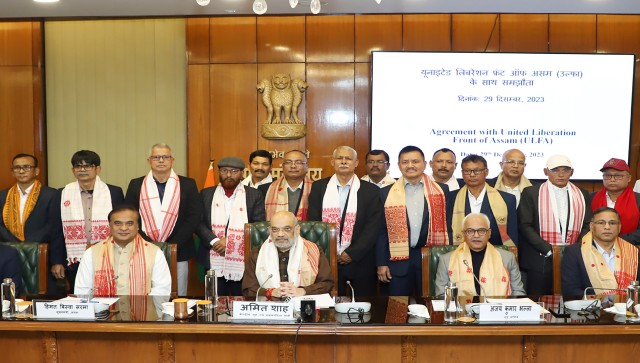)